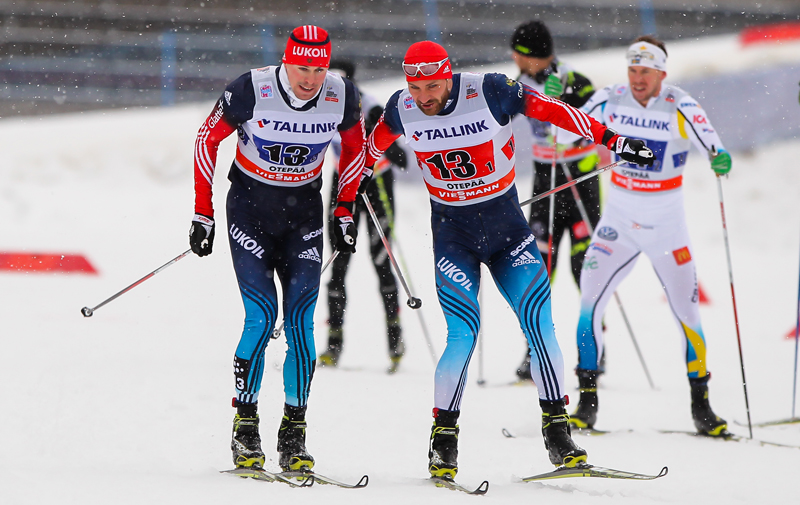
If the preceding women’s team sprint proved anything on Sunday it was that Norway could be beaten. Russia’s Sergey Ustiugov had all the motivation he needed after breaking a pole in the individual classic-sprint semifinal the day before at the World Cup in Otepää, Estonia.
Sunday’s 1.5-kilometer course was the same course the used for the individual men’s classic race. It included two steep climbs that would be good places to attack if teams were looking to gain separation from the pack.
Ten teams advanced from the semifinals to the 6 x 1.5 k freestyle team sprint final: Noway I (Anders Gløersen/Finn Hågen Krogh), Norway II (Ola Vigen Hattestad/Pål Golberg), Russia I (Alexey Petukhov/Sergey Ustiugov), Russia II (Andrey Parfenov/Nikolay Morilov), Italy (Dieter Nöckeler/Federico Pellegrino), Switzerland II (Roman Schaad/Gianluca Cologna), Canada (Jess Cockney/Lenny Valjas), Finland I (Matias Strandvall/Risomatti Hakola), Poland (Maciej Kreczmer/Maciej Strega), and Estonia I- (Raido Rankel/Peeter Kummel).
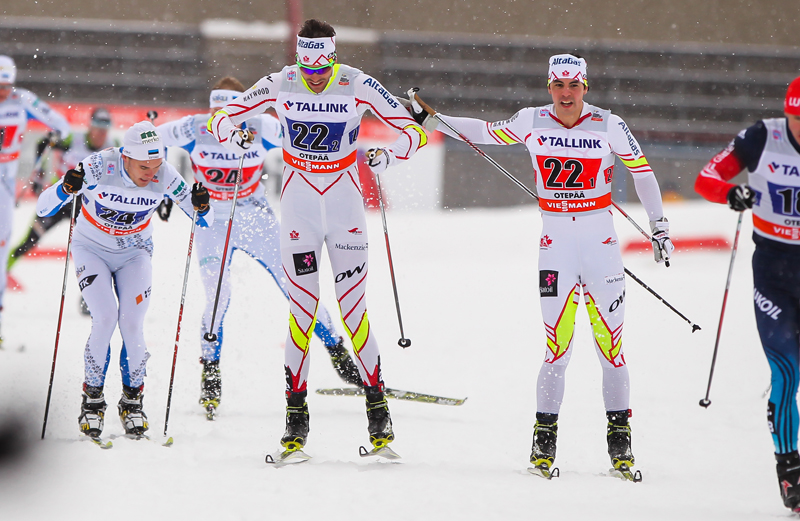
At the start of the final, the first two laps went out at a relatively leisurely pace. There weren’t any real attacks; any attempts were quickly countered and a pack reformed.
The lead rotated between Russia’s Petukhov, Norway’s Gløersen, and Switzerland’s Schaad. At times, Poland’s Kreczmer was up front driving the pack, but Russia and Norway were always close behind. Canada’s Jess Cockney was near the back, but still in contact with the entire group.
On the third lap before the third exchange, Petukhov and Gløersen continued to lead the pack. Norway’s second team was close, with Hattestad sitting in third position. Midway through the second downhill, Petukhov picked up the pace and attempted a small attack off the front. Gløersen was able to respond and bridge up to the Russian, and two other teams caught up by the exchange.
There, at the halfway point, Gløersen tagged Krogh 0.3 seconds ahead of Norway II, and Russia was 0.6 seconds back in third. Russia’s second team was another 0.1 seconds behind in fourth, and Switzerland trailed by 1.2 seconds.
As the laps went by, it took the top skiers less time to complete them. Eventually a team was going to make an attack and it all depended on who could counter and when. The attack finally happened on the fifth lap. Petukhov initiated it and Gløersen immediately responded to match his pace. The attack opened up a sizable lead heading into the final exchange. Russia came through 0.6 seconds ahead in first, Norway was second, and Russia II as the next-closest team was 7.2 seconds back in third.
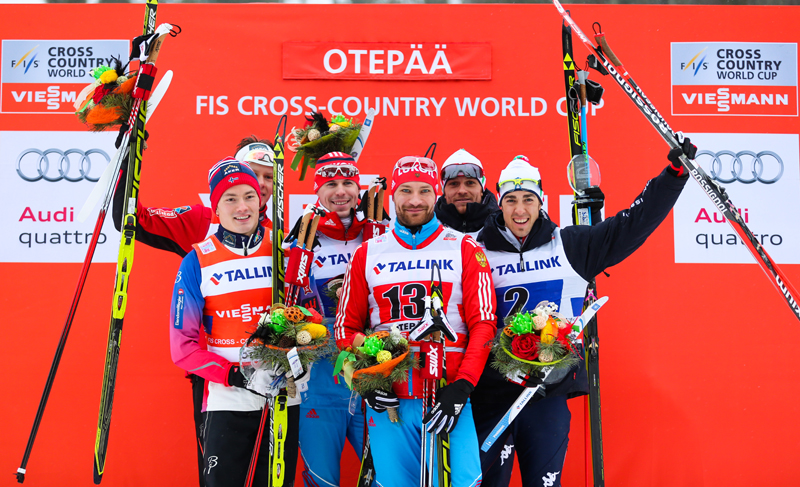
As Russia and Norway skated away and battled for first and second place, the fight for third place was just as intense. Italy, Switzerland, Russia and Norway’s second team were all in position for the final podium spot. Italy had the biggest deficit to regain, coming through the exchange 12.2 seconds back in sixth.
After a clean exchange to start the final lap, Ustiugov and Krogh still remained squarely in the lead. Ustiugov had fresher legs as a result of crashing out of Saturday’s semifinal; Krogh reached the classic-sprint final and placed fifth.
The pair skied together, each taking a turn leading. At the start of the last climb, Ustiugov attacked and it proved to be the winning move. His surge created enough separation from Krogh to build a gap he carried to the finish line. Ustiugov took the win for Russia in 19:39.1, and Krogh finished 0.4 seconds later in second.
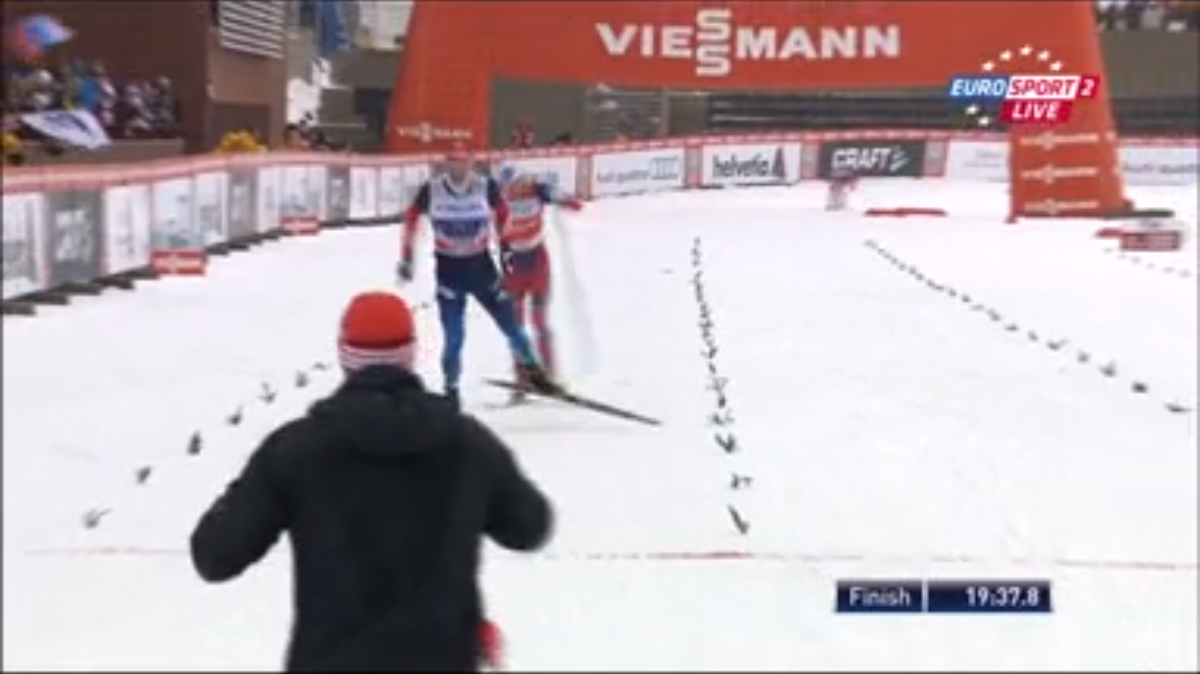
Italy’s Pellegrino skated a strong last lap to close down almost a 12-second deficit at the start of the lap to outsprint Norway II, Russia II and Switzerland II for third place, 12.9 seconds after Ustiugov.
“It feels amazing to win in Otepää,” Petukhov told FIS after the race. “We like it here very much. The atmosphere was great both in the stadium and at the track. Sergey was very strong today. We were a great team.”
Pellegrino also was extremely happy after rising from sixth to third on the final lap. “It’s fantastic to be back on the podium,” he said. “It is incredible to share the podium with Dietmar. It is great for the Italian Cross-Country Skiing”
Cockney, Valjas Take Eighth
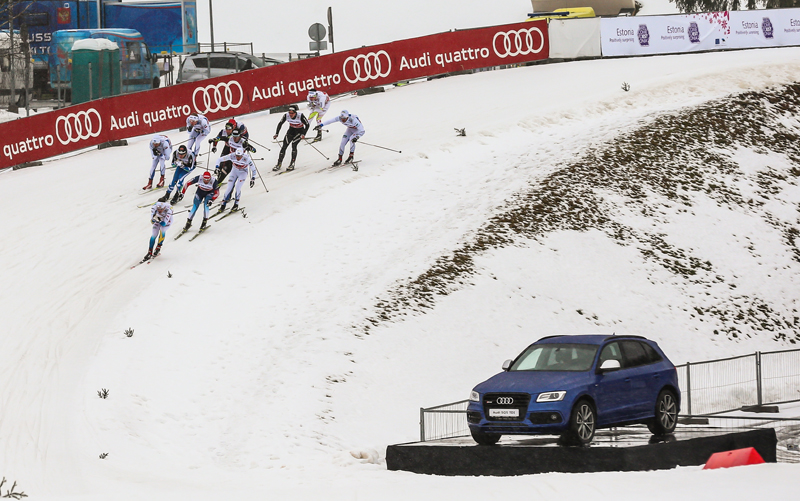
Canada finished eighth place, 22.8 seconds behind Russia. It was the first time Cockney and Valjas have raced together in a team sprint in Europe. They previously teamed up for a 10th-place finish at a World Cup in Quebec City two years ago. That was the last time Valjas made the final in a team sprint.
On Sunday, they qualified with the third-fastest time in the first semifinal to earn a spot in the final. Six teams from that heat advanced to the 10-team final.
“I was definitely eager to forget about yesterday’s race, and put up a good result this morning,” Cockney said in a Cross Country Canada press release, referring to his 61st place in the classic sprint. Valjas also missed qualifying in 45th on Saturday.
“Personally I felt like I skied calmly and made good decisions tactically to help us – especially in the semifinal,” Cockney added.
In the final, Cockney attempted to get closer to the leaders early on the first hill, but was stuck in seventh before the second climb. Regardless, he was within 1.8 seconds of the leaders at the first exchange, tagging Valjas in eighth.
Valjas maintained the time back on the second leg but slipped one position, handing off to Cockney in ninth and 1.9 seconds out of first. At that point, all 10 teams were within two seconds of the lead.
The Canadians found themselves in 10th at the third exchange, 3.9 seconds back, and had fallen nearly 10 seconds off the pace on the fourth lap.
Cockney skied them up to eighth on his final time around, 16 seconds out of first, and Valjas held their position to the finish with the fourth-fastest anchor leg, crossing the line 22.8 behind Ustiugov.
Neither Cockney nor Valjas could be reached by email for comment.
— Alex Kochon contributed reporting



